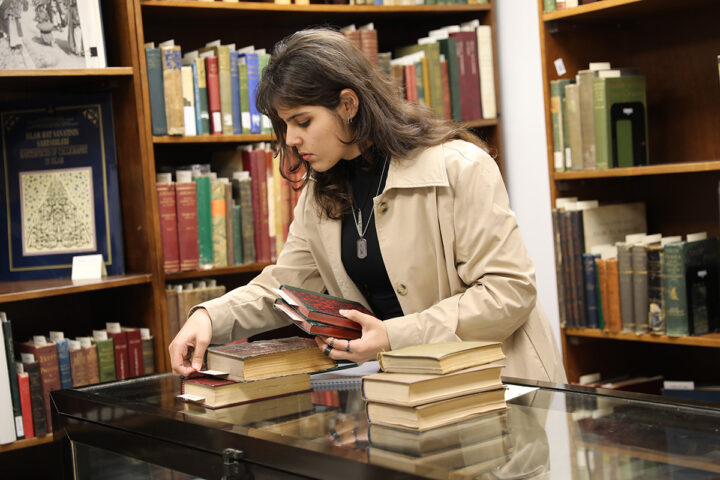by Dima Nafez Amin Harb

My name is Dima Nafez Amin Harb, and I am a cultural resources management and conservation graduate from the University of Jordan, the valedictorian of my major. Throughout my education, my professors would always recommend several organizations that could assist us with our study, and the American Center of Research was always at the top of that list, which is how I was first introduced to it. Consequently, I did much research and wrote many essays within the walls of ACOR’s library.
I was given the opportunity to be an intern at ACOR from August to October 2024, with tasks revolving around the library and helping the associate librarian, Samya Khalaf Kafafi.
One of the tasks that took the longest in my short stay was reorganizing the collection of rare books. This was an incredible experience, seeing and helping to classify some of the books that tell stories even by the outside of their covers, of how time and readers have treated them. I also believe I enjoyed it because my major focuses on conservation and restoring such materials, and seeing books that hold so much importance was an honor. We had to be careful regarding everything: handling the most crucial volumes, fixing some of the very loose spines so that they don’t become rubbed or lost, carefully maintaining the books, and moving them from one shelf to another while keeping intact everything within their covers, such as maps and even notes that had been left there by some of the first readers.
The kind librarian came up with the idea of displaying the book’s classification numbers in a way that did not require taping anything onto the books (which might damage the spine and covers) and would limit the abrasion that can occur when someone pulls a book from the shelf to see its title or number. The results were perfect, to say the least: the solution was to place a piece of paper with the classification number in the book so that it sticks out above the pages and covers. It took nearly two months to finish preparing the entire collection in this way, and the result was a mini private display of books that is not open to the public.
My second longest task was to check and organize the maps, which are also off limits to the public without permission. I had to be very careful and wear gloves while removing the huge sheets of maps in order to place them in the right spot. To make sure no edges of these large documents get damaged in the process, maps need to be handled in a specific manner.
Not only did I enjoy working with these materials, but the staff of the library are also incredibly sweet and helpful—they are always so nice and pleasant and have amazing patience while teaching new interns or simply answering inquiries, especially the kind associate librarian, Samya, who gives life to the library.
I am very grateful to have been given this opportunity. I have learned a lot, ranging from social skills to books and understanding their secrets, and far more. It was a fruitful three months’ experience, and I hope my short stay has helped in the never-ending tasks of the library.
Thank you kindly.
Dima Nafez Amin Harb is a recent graduate from the University of Jordan who was valedictorian of her major (cultural resources management and conservation). Ambitious and wishing to continue her education further, she has participated in such events as Working for the Future of Our Past workshops held by the German Academic Exchange Service (DAAD) in Germany, Egypt, and Germany, as well as the May 2023 ICOMOS workshop. Fluent in English and Arabic, Dima is now learning German. She is also a published artist.